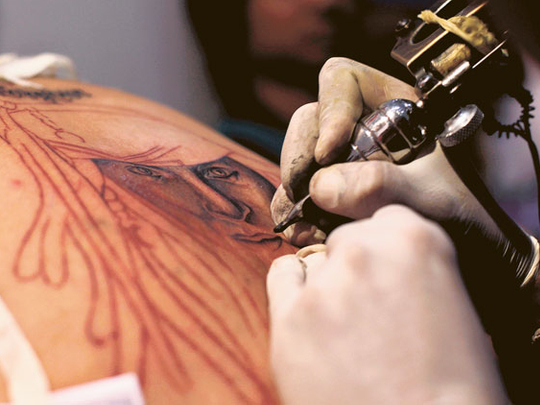
New Delhi: A pair of wings on the back, a butterfly on the ankle or simply initials on the hand — beautifully designed tattoos are a craze these days. But getting yourself inked can expose you to the dangerous hepatitis B or C virus and even HIV, warn doctors.
Getting a permanent tattoo involves piercing the skin with a needle and injecting coloured ink in different designs. If the needle or the surroundings is infected, then the chances of transmission of the hepatitis virus goes up manifold.
"Tattoos are a potential cause for spreading hepatitis B and C virus, even HIV. While the number of cases is still not very high, we do come across patients who have been infected this way," Ajay Kumar, senior consultant (gastroenterology) at the Indraprastha Apollo hospital, said.
"The main risk is if the equipment, which is the needle, is infected and not enough precaution is taken to prevent transmission," he added.
But it's not just the needle that can spread the virus.
Ajay K. Sachdev, head of surgical gastroenterology at the Artemis Health Institute, Gurgaon, said: "Needles are not the only things that can cause transmission of the hepatitis virus or even HIV. The silent culprits are the expensive ink bottles in which the artist dips his needle time and again while doing the tattoo."
"So even if they use disposable syringes or fresh gloves, if an artist uses the same ink bottle for several clients, the chances of transmission of the virus increase. Now since these ink bottles are mostly imported, they generally don't use fresh bottles for every client," Sachdev said.
Tattoo science
Explaining the science behind it, Sachdev said: "Tattoo making involves pricking the needle deep into the dermis — the layer under the skin surface — which results in bleeding and the same needle is dipped into the ink bottles which leads to transferring of infection.'
"The chances of a person getting infected are higher if one gets it done immediately after an infected person gets a tattooed in a parlour,' he said.
While there are no official figures, Sachdev said five to 10 per cent are infected by hepatitis in India. The country also has around 2.5 million HIV-affected people. According to the World Health Organisation (WHO), the viral hepatitis kills more people than any other communicable disease in Southeast Asia (the world body categorises India in this region).
In fact, the estimated number of deaths in the region associated with viral hepatitis and its complications exceeds deaths due to malaria, dengue and HIV/Aids combined.
Yesterday was observed as the first official WHO World Hepatitis Day.












